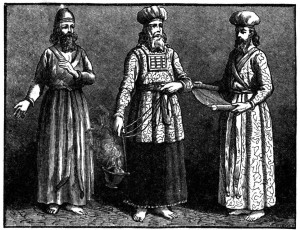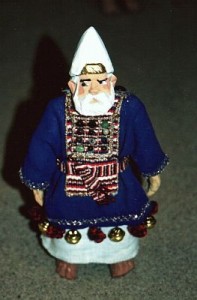The focus of Leviticus is holiness and holy living. Holiness is the chief attribute of Elohim and the most defining aspect of his character. It has to do with the fact that Elohim is entirely good and without evil and moral defect and sinless. This is why the spiritual beings around his heavenly throne are constantly crying, “Holy, holy, holy” in his Presence (Isa 6:3; Rev 4:8). This is why one of his titles is The Holy One of Israel,which is used more than thirty times in the Tanakh (e.g., 2 Kgs 19:22; Ps 71:22; Isa 1:4; Jer 50:29).
The Hebrew word for holy and holiness is kadosh, which is defined as “sacredness, consecrated, set-apartness or separateness.” That which is holy or kadosh relates to that which belongs to the sphere of the sacred, godly or heavenly and is distinct or separate from the sphere of the common, profane, defiled or polluted. Everything about Elohim is holy or set-apart compared to man who is completely polluted and defiled by sin and is thus unholy (Jer 17:9; Rom 3:23; Isa 64:6).
The Tabernacle of Moses had two rooms: the holy place and the holy of holies. The nomenclature of these rooms relates to the chief attribute of Elohim, which is his holiness.
Elohim gave Moses, Aaron, the priests and Levites strict protocols to follow to insure that the tabernacle stay holy and keep from becoming profane, polluted or defiled. This involved caring for and properly handling the building and its furnishings as well as the priestly attire and their bodily, ritualistic and spiritual cleanliness. If these protocols weren’t followed, there were penalties — sometimes involving the death of the violator. If they were followed, the result was a blessed relationship with Elohim.
The requirements for coming into and ministering in the Tabernacle of Moses, the dwelling place of Elohim’s Presence (Exod 25:8) teach us several things.
First, Elohim is holy and undefiled and is thus transcendent above the earthly and human plane. He is pure, set-apart and undefiled by.
Second, heaven and the Presence Elohim is a holy and undefiled place. The tabernacle was the earthly dwelling place of Elohim’s Presence (Exod 25:8). It and everything about it was to remain holy or set-apart. Nothing was to defile it.
Third, maintaining a high standard of holiness with regard to everything pertaining to the tabernacle teaches us that no one can come into the Presence of Elohim without first going through proper protocols to become undefiled.
Forth, there was a death sentence upon those who refused or neglected to follow these protocols. This teaches man to fear, honor, respect and even to dread Elohim who has the power over life and death. Man cannot come into Elohim’s Presence in a casual, cavalier or arrogant manner in a defiled or polluted state.
Fifth, the Tabernacle of Moses was a “processing center” to aid man in going from an unholy, polluted and sinful state to progressively becoming more and more holy and sinless. Eventually, man could come to a place — by following YHVH’s protocols of holy living — of intimate fellowship with Elohim. This is pictured by the inner room, or holy of holies, of the tabernacle where the Presence or Kavod of Elohim was dwelt. The holy of holies is representative of Elohim’s heavenly throne room.
Sixth, man was created in Elohim’s image to have an intimate relation with him and with the capability of reflecting his divine character. When man sinned in the garden, man’s relationship with Elohim was cut off. The Tabernacle of Moses shows man how to deal with the pollution or defilement of sin through blood atonement and the eventual sacrifice of Yeshua on the cross to which all the bloody, sacrificial rituals of the tabernacle pointed.
Seventh, there is no other way for man to come into the Presence of Elohim except through the protocols that he has established. Man has to recognize his sinfulness, turn away from his state of unholiness or pollution by making the proper sacrifices. He must then turn to and embrace Elohim’s holy or righteous standards for living a sinless life.
Holiness is the greater message of Leviticus as it relates to the redeemed believer coming into conformity with the exalted and righteous standards of a holy Elohim. This occurs when one recognizes their unholiness or sinfulness, puts their faith in the blood atoning sacrifice of the Lamb of Elohim, Yeshua the Messiah who died on the cross in payment for men’s sins, and then turns from sin by adhering to Elohim’s standards of righteousness as outlined in the Torah and the rest of the Scriptures, and as lived out by Yeshua and his immediate disciples.
Holiness involves heeding Elohim’s call to become his special and treasured possession by following him and allowing him to separate us from the defilement or pollutions of the heathen nations around us (Lev 20:26; Deut 7:6; 14:2; 26:19).
This message of holiness — and the message of the entire Bible — can be succinctly summed up by Elohim’s loving and longing cry to his people on several occasions to be holy as he is holy (Lev 11:44, 45; 20:7, 26; 1 Pet 1:16). The Torah shows us how to be holy (Lev 20:7–8). The Torah (and the rest of Scripture) shows us that being holy not only involves behavior, but man’s thoughts and attitudes, words and physical cleanliness as well as the observance of holy times (e.g., the Sabbath and biblical festivals), and respect of things that are dedicated to Elohim. Men must learn to make a division or separation between the spheres of the holy and the profane and to keep them separate (Ezek 44:23; 22:26), and to not let the latter pollute the former.
The message of holiness has serious implications for each individual, for as the writer of the Epistle to the Hebrews declares, without holiness, no one will see Elohim (Heb 12:14 cp. Ps 15:2ff).




